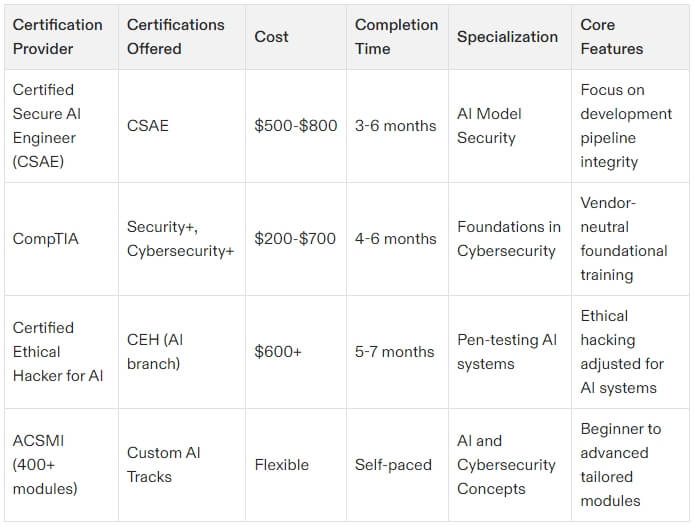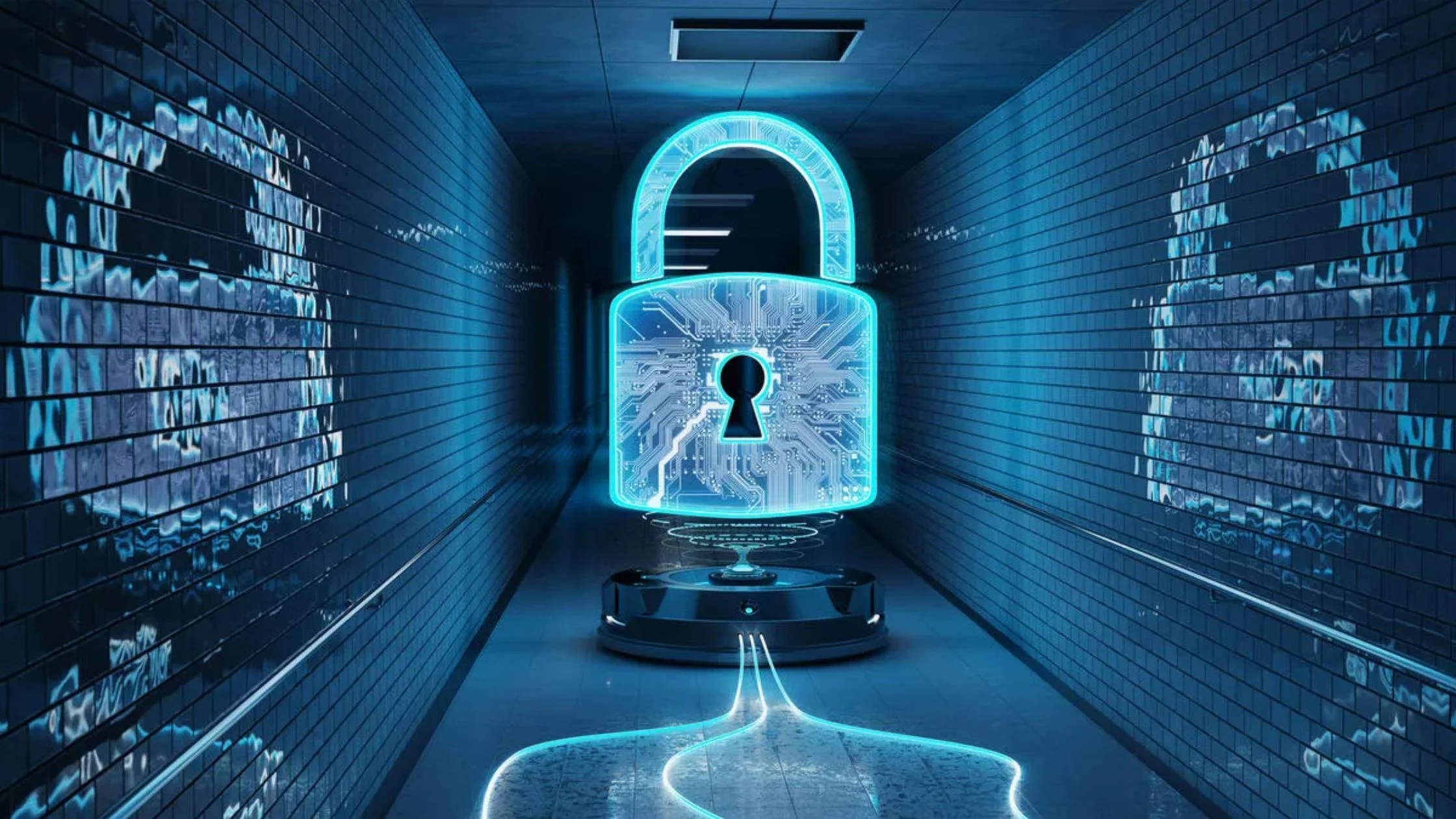Table of Contents
- Why is Cybersecurity Certification for AI Important?
- How Cybersecurity Certification for AI Empowers Professionals
- Top Cybersecurity Certifications for AI Professionals
- Benefits of ACSMI Certification
- Career Impact of Cybersecurity Certification for AI
- (FAQs) Frequently Asked Questions
- 1. Can I earn a cybersecurity certification for AI without prior IT experience?
- 2. Which certification is best for securing AI systems?
- 3. How long does it take to complete a certification?
- 4. Is a cybersecurity certification for AI globally recognized?
- 5. Why do AI professionals need cybersecurity knowledge?
- Certification Comparison
- Final Thoughts
Artificial Intelligence (AI) is rapidly transforming industries, from healthcare to finance, but it also brings significant security challenges. Hackers are learning to exploit AI models, manipulate algorithms, and access sensitive data within AI systems. For professionals navigating this space, a cybersecurity certification for AI prepares you to defend these cutting-edge technologies.
Whether you’re an AI developer, researcher, or data scientist, cybersecurity expertise is no longer optional—it’s a must.
Why is Cybersecurity Certification for AI Important?
1. AI is the New Target
AI relies on vast amounts of data and complex algorithms. Malicious actors exploit vulnerabilities in these systems through data poisoning, algorithm manipulation, or reverse engineering machine learning models. A cybersecurity certification ensures you can foresee such risks and mitigate them effectively.
2. Regulation and Compliance
Emerging AI regulations like the AI Act or evolving guidelines like GDPR require secure AI system implementations. Certification equips you with the knowledge to design solutions that comply with legal and ethical standards.
3. Strengthen AI Governance
Organizations face growing pressure to make AI transparent, accountable, and secure. A certified professional can guide AI projects with a governance-focused, security-first approach.
4. Enhance Innovation Safely
Cybersecurity certification for AI strikes a fine balance—allowing professionals to innovate while upholding strong security measures. This fosters trust in the AI systems you develop or manage.
5. Unlock Career Opportunities in AI Cybersecurity
AI-driven job roles are soaring, and combining AI expertise with cybersecurity knowledge makes you uniquely positioned to land roles like AI Security Specialist or Data Protection Officer.
How Cybersecurity Certification for AI Empowers Professionals
Earning a certification isn’t just about securing systems—it’s also a pathway to gaining the skills that can fully integrate AI into workflow, product designs, or infrastructure while addressing vulnerabilities. The benefits are vast.
Better AI Decision-Making
Certified professionals know how to identify and prevent key vulnerabilities, such as injecting adversarial attacks into AI training data.
Collaborating with Cross-Functional Teams
With certification, you’ll be able to bridge the gap between cybersecurity experts, business teams, and AI engineers, ensuring cohesive approaches.
Achieving Ethical AI Development
Security certifications for AI underline the principles of fairness, accountability, and transparency. You’ll not only secure AI but also create systems people trust.
Top Cybersecurity Certifications for AI Professionals
1. Certified Artificial Intelligence Security Specialist (CAISS)
CAISS focuses on securing AI models and datasets from attack vectors unique to algorithms, including data poisoning and adversarial samples.
2. Certified Secure AI Engineer (CSAE)
A technical certification designed to teach AI developers how to build secure machine learning pipelines and implement audits.
3. CompTIA Security+
While not AI-specific, this certification offers a great starting point for any professional moving into cybersecurity. It equips learners with a strong foundation in risk management.
4. Certified Ethical Hacker (CEH) for AI Systems
This branch of CEH targets ethical hacking for AI, teaching how to identify weaknesses in intelligent systems.
5. ACSMI’s Cybersecurity Certification for AI
ACSMI tailors their 400+ modules to focus on the intersections of AI and cybersecurity. This certification is perfect for non-technical and technical professionals alike, offering everything from foundational security to advanced AI model protection.
Benefits of ACSMI Certification
- Comprehensive Learning: Access to 400+ training modules, including AI security, compliance, and data protection.
- Self-Paced Programs: Tailored for busy professionals who need flexibility.
- Expert Instruction: Guidance from leading AI security experts, equipping you for real-world challenges.
- Sales and Management Modules: Non-tech leaders can also benefit from AI-focused security.
Explore ACSMI Course Options for AI
Career Impact of Cybersecurity Certification for AI
AI job growth is explosive. Gartner projects AI-driven businesses will generate $2.9 trillion in value by 2025. But as virtual assistants, predictive models, and deep learning solutions grow in adoption, so does their susceptibility to attack.
Gaining a cybersecurity certification for AI secures jobs in roles such as:
- AI Security Specialist: Safeguard proprietary algorithms and user data.
- AI Compliance Consultant: Ensure all systems comply with current cybersecurity and data regulations.
- Machine Learning Pipeline Auditor: Certify data sources are secure and algorithms function according to ethical standards.
- CISO or CTO with AI Specialization: Head security or technical strategies where AI is business-critical.
Expected Annual Salaries
- AI Security Specialist – $120,000+
- AI Compliance Officer – $100,000 to $140,000
- ML Pipeline Auditor – $90,000 to $130,000
(FAQs) Frequently Asked Questions
1. Can I earn a cybersecurity certification for AI without prior IT experience?
Yes! Certifications like those from ACSMI are designed to cater to professionals at all levels, including those without a technical background.
2. Which certification is best for securing AI systems?
The CAISS and ACSMI’s AI-tailored certifications are excellent choices, offering insights into adversarial attacks and AI compliance.
3. How long does it take to complete a certification?
Most programs take 2-6 months depending on the provider and your schedule. ACSMI’s flexible options allow self-paced completion.
4. Is a cybersecurity certification for AI globally recognized?
Certifications like CAISS, Security+, and those offered by ACSMI are widely recognized and respected in global markets.
5. Why do AI professionals need cybersecurity knowledge?
AI projects deal with sensitive data and complex algorithms prone to attack. Security expertise ensures vulnerabilities are addressed to uphold data integrity and client trust.
Certification Comparison 
Cybersecurity certification for AI not only equips professionals with the skills to protect AI systems but also enhances their ability to innovate responsibly. With AI’s potential to revolutionize industries, certified experts are uniquely positioned to lead projects that prioritize ethical AI development, ensuring that AI technologies are not only secure but also fair and transparent. This dual focus on security and ethics is becoming increasingly important as AI systems are integrated into critical sectors like healthcare, finance, and autonomous vehicles.
Final Thoughts
A cybersecurity certification for AI goes beyond protecting data and algorithms—it builds trust, fosters collaboration, and positions you as a leader in a cutting-edge field. AI and cybersecurity demand innovative thinking, and pursuing certification gives you the tools to thrive in roles spanning development, auditing, and governance.
Take your knowledge to the next level with ACSMI’s tailored 400+ training modules and prepare to lead confidently in safeguarding AI-driven solutions. Your expertise can be the reason tomorrow’s AI is safe, ethical, and groundbreaking.
Start your certification today, and future-proof your skills in one of the tech industry’s fastest-growing sectors!

Leave a Reply